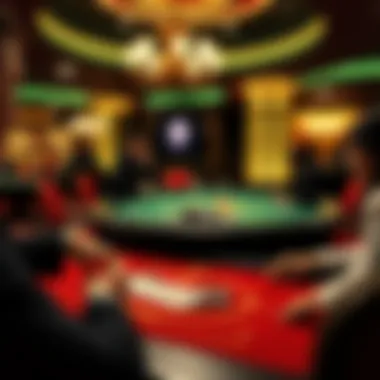Mastering Blackjack: Strategies for Casino Success


Intro
Entering the world of blackjack, or as many call it, 21, is akin to stepping into a dance hall filled with both excitement and caution. This game, steeped in history and layered with strategy, holds a magnetic pull for both novices and seasoned gamblers alike. As you navigate through the rules and nuances of 21, you might wonder how one can tilt the odds in their favor while having a great time.
In this article, we aim to break down the multifaceted aspects of playing 21 in casinos, exploring various strategies to improve your game, analyzing the house edge, and understanding the emotional landscape that accompanies gambling. From time-tested techniques for beginners to advanced strategies for the veterans, our journey promises to equip readers with vital insights. \n
In the casino atmosphere, where every bet feels like a leap of faith, grasping the essentials and elevating one's playing style can make all the difference. Both fun and thrill are wrapped in the intricacies of how to play correctly and mitigate risks while being aware of the social dynamics in play.
So, let’s dive in and examine how to navigate this exhilarating game, ensuring you’re not just playing, but playing effectively.
Game Strategies
Understanding the rules and strategies behind blackjack can be pivotal for your success at the tables. Let's break down what works for newcomers and those looking to refine their skills further.
Winning Techniques for Beginners
For those dipping their toes into the waters of 21, there are a few foundational techniques that can keep you afloat:
- Know the Basics: Understanding what a soft hand is versus a hard hand is crucial. A soft hand includes an Ace counting as 11, while a hard hand does not.
- Review the Table Rules: Different casinos may have slight variations in rules. Familiarize yourself with specifics, such as how many decks are in play or the offerings for blackjack pay.
- Basic Strategy Charts: Using a basic strategy chart can be a game changer. This chart tells you when to hit, stand, double down or split based on the dealer's upcard, significantly reducing the house edge.
- Stick to Your Limits: Set a budget before you play and don’t exceed it. The emotional ramp-up can cloud your judgment, so discipline is key.
Advanced Strategies for Seasoned Players
For those who have mastered the basic strategies and wish to take their game to the next level, consider the following:
- Card Counting: This technique involves keeping track of high and low cards that have been played to adjust your bets. While not illegal, many casinos keep a watchful eye for counters.
- Shuffle Tracking: Advanced players may attempt to track groups of cards through the shuffle to predict what might be dealt next—it's an intricate dance that requires patience and sharp focus.
- Bet Sizing: Understanding when to raise or lower your bets based on your count can improve your profitability. This strategy takes a lot of instinct and experience.
- Using Variants to Your Advantage: Some variants of blackjack, like Spanish 21 or blackjack switch, can feature specific rules that can offer advantageous conditions. Knowing these can enhance your edge.
A disciplined player, who understands both strategy and self-control, can enjoy the game and come out ahead—at least more often than not.
By applying these varied strategies, players can greatly enhance their experience at the blackjack table. As with any casino game, blending skill with composure is crucial for keeping your head above water—and maybe even striking gold.
Understanding the Basics of
Getting familiar with the basics of 21 is crucial for anyone stepping into the world of this card game. It's not just the rules and game structure that players need to grasp, but also the cultural significance and the thrill that surrounds the gameplay. Understanding these foundations can enhance your gaming experience greatly. Think of it as laying a solid foundation before constructing a house; without it, the ensuing structure is bound to face its share of troubles.
The Origin of
The journey of 21, or blackjack as most folks know it, is woven into the rich tapestry of casino history. It dates back to the 17th century in France, where it was known as "Vingt-et-Un," translating to twenty-one. This name was chosen due to the goal of the game—getting as close to twenty-one without going over, to beat the dealer’s hand.
Over the years, variations of this game sprouted across Europe, but it was in America, notably during the Prohibition era, that it found its footing in the gambling culture. Players were enthralled by the prospect of winning money easily, leading to the birth of various house rules and betting styles. The game's evolution shows how it has retained its charm across centuries, making it a staple in casinos worldwide.
Game Rules and Structure
Understanding the game rules and structure is like having a roadmap—without it, navigating can be challenging. Here's a brief overview:
- Objective: The main aim is to achieve a hand value of 21, or as close to it as possible, without exceeding this number.
- Card Values: Cards 2 through 10 are worth their face value, face cards (Kings, Queens, Jacks) are worth 10, and Aces can be worth either 1 or 11.
- Gameplay Process: Each player is dealt two cards, while the dealer also receives two cards—one face-up and one face-down. Players can choose to hit (take another card) or stand (keep their current hand).
Here’s where it can get interesting. Players may also encounter options like doubling down (doubling the initial bet after receiving the first two cards) or splitting (dividing a pair into two separate hands). Knowing when to use these options can make a world of difference in the game outcomes.
Glossary of Terms
Like any specialized field, blackjack comes with its terminology. Familiarizing yourself with this jargon will keep you in the loop and help you make informed decisions at the table. Here are a few key terms:
- Hit: Requesting an additional card to improve your hand.
- Stand: Declining to take more cards, hoping your total is sufficient to beat the dealer.
- Bust: Going over 21, resulting in an automatic loss.
- Natural 21: An Ace and a ten-value card as your initial two cards, winning the game unless the dealer also has a natural.
Many players find that knowing these terms helps them feel more confident while playing, enhancing both their performance and enjoyment.
"Understanding the basics of 21 is not merely a matter of rules, but a step into a rich tradition filled with strategy and excitement—a true gambler's art."
As players dive deeper into the nuances of 21, they'll recognize that these basic elements are merely the tip of the iceberg. A firm grasp of the fundamentals makes the advanced strategies even more digestible and enjoyable.
Game Strategies
When delving into the vibrant universe of 21, or blackjack as it is commonly known, one can't underestimate the crucial role that game strategies play. These strategies not only sharpen your decision-making process but also pave the way for a more informed and rewarding experience at the tables. Mastering various tactical approaches can lend a significant edge, helping both novice and experienced players navigate the ebbs and flows of the game.
Implementing effective game strategies in blackjack means striking a balance between understanding mathematical probabilities and honing one's psychological acumen. The focus on these strategies can lead players to enhance their gameplay, allowing them to maximize winnings while minimizing losses.
Additionally, well-thought-out strategies can foster a sense of control over the game's inherent volatility, a factor that keeps many players coming back for more, even as they face inevitable ups and downs.


Basic Strategy Charts
Basic strategy charts represent a fundamental tool for making optimal playing decisions based on your hand versus the dealer’s upcard. Through mathematical calculations, these charts pinpoint the best move for every potential combination of player and dealer cards, maximizing the player's potential to win while minimizing the house edge. Familiarizing oneself with these charts helps in avoiding common pitfalls that stem from emotional decision-making.
These charts provide clear guidance on whether to hit, stand, double down, or split, helping players follow a more rational, calculated approach. Players who consistently use basic strategy charts can significantly improve their overall odds, shifting the game in their favor.
Card Counting Techniques
Understanding card counting techniques is vital for those who aspire to gain a competitive edge in 21. Count strategies hinge on the premise that a player's odds improve as the deck becomes richer in high-value cards (like tens and aces). Here's a closer look at three common card counting methods:
Hi-Lo Method
The Hi-Lo method is one of the most acclaimed card counting systems, favored by many players. What sets this method apart is its simplicity, making it accessible even for less experienced gamblers. In this system, cards are assigned values: +1 for low cards (2-6), 0 for mid-range cards (7-9), and -1 for high cards (10-Ace).
Players keep a running count as cards are played, adjusting their bets according to the count. As the count increases, indicating a favorable deck for the player, one might increase their stakes, which can directly impact potential earnings. The strength of the Hi-Lo method lies in its straightforward implementation, but it demands concentration and practice, making it a rewarding choice for the right kind of player.
KO Method
An alternative to the Hi-Lo method, the KO Method offers a simple and unbalanced counting approach. Instead of assigning values where low cards yield positive points and high cards negative, this system allows players to maintain a running count that remains positive.
This method can be particularly appealing to beginners because it eliminates the need to convert the running count into a true count, which can be a tricky step in the high-level strategies. However, while more intuitive, it may yield slightly less precision than other methods.
Omega
The Omega II method stands out for its sophisticated system that employs a balanced approach with a wider range of counting values (+2 for high cards and -2 for low cards). This complexity allows for greater accuracy in wagering strategies as the count fluctuates.
Many seasoned players appreciate this method for its robustness and potential to provide deeper insights into the deck composition. However, it requires diligent practice and memorization. Increased complexity could hinder less experienced players from reaping its benefits consistently.
Betting Strategies
Betting strategies form another essential layer to master while playing 21. Understanding how to manage your betting can either make or break a session at the table. Here's a look at some popular strategies:
Flat Betting
Flat betting revolves around maintaining the same bet size regardless of wins or losses. This method simplifies the betting process and helps in managing one's bankroll effectively. Flat betting is particularly a solid option for players who wish to avoid the psychological stress of fluctuating wager sizes, leading to a steadier path through the gaming experience. However, it does limit potential returns during streaks of good fortune.
Martingale System
The Martingale System is a popular betting strategy that operates on a classic principle: doubling your bet after each loss. The core idea is that eventually, a win will occur, recovering all previous losses and securing a profit equal to the original stake. While theoretically appealing, this approach requires a substantial bankroll and carries the inherent risk of hitting table limits, which can hinder its long-term effectiveness.
Paroli System
In contrast to the Martingale, the Paroli System encourages players to increase their bets after wins. This system operates on the principle of capitalizing on winning streaks while limiting losses. The simplicity of this method appeals to many, as it advocates a more positive approach to gambling. Still, while it might protect players from excessive losses, it can also curtail potential gains during unfortunate turns.
Understanding these various strategies enriches the gambling experience significantly, setting players up for success in the fast-paced, excitement-filled world of blackjack.
The House Edge and Player Advantage
Understanding the house edge in 21 is essential for any player serious about improving their game. The house edge simply refers to the mathematical advantage the casino has over the players. In the realm of 21, this edge can vary based on a multitude of factors, such as the rules employed at the table, the player's strategy, and even the specific nuances of the casino environment itself. Knowing how to navigate and minimize this edge can significantly enhance one’s chances of success at the tables.
The knowledge of how the house edge operates is beneficial for players as it can inform betting decisions, risk management, and overall gameplay. With a clear grasp of these principles, a player can shift from being merely a participant to a more strategic contender, optimizing their chances of wreaking havoc on the dealer's hand while keeping their bankroll intact.
Understanding the House Edge
In its simplest terms, the house edge is a percentage that indicates how much the casino can expect to win from each player over time. Even in the most skillful hands of players, this edge remains a constant due to the inherent rules of the game.
For example, when a player opts for a typical game scenario with favorable rules, the house edge can hover around 0.5% to 1%. However, if a player makes decisions that stray away from optimal play, it is possible for the house advantage to balloon to over 2%. This stark difference illustrates how crucial it is to be well-versed in basic strategies and rules. Also, it’s worth noting that variations such as allowing the player to double down or split cards can impact this edge.
- Basic Rules: Understanding how to play does not stop at memorizing the statuses of wins and losses. Players should also be aware of how much the rules sway the house's percentage.
- Game Conditions: Conditions like the number of decks in play or if the dealer takes a card on a soft 17 can alter the edge greatly.
“Knowledge is power. Knowing the house edge can keep your head above water at the tables.”
Impact of Rule Variations
Rule variations can significantly impact both the house edge and a player’s advantage. Different casinos might employ distinct rules, making it imperative for players to pay attention before taking a seat at a table.


For instance, certain casinos might offer games where blackjack pays 3:2 instead of the less favorable 6:5. This seemingly small detail can considerably shift the house edge. A game paying 3:2 typically has a lower house edge compared to one paying 6:5. Similarly, rules regarding doubling down, splitting pairs, or surrender can also create meaningful shifts in your expected loss.
Here's a quick look at how some rule variations affect the game:
- Blackjack Payout: 3:2 vs. 6:5 - Significant difference in house edge.
- Doubling Down: Restrictions on doubling down (like only on certain totals) can increase the house edge.
- Surrender Rules: When players can surrender half their bet after the first two cards can lessen losses, lowering the overall house advantage.
In summary, being conscious of how rule variations impact your odds and the house's advantage is crucial for maximizing success at the table. This knowledge leads to better decision-making, ultimately promoting a more enjoyable and potentially lucrative experience in the world of 21.
Psychological Aspects of Playing
Understanding the psychological aspects of playing 21 is crucial in shaping the way one approaches the game. This section delves into the emotional highs and lows that accompany gambling and examines how mindset impacts decision-making. A solid grasp of these elements not only enhances the gaming experience but can also be the difference between a successful session and one that's fraught with poor choices.
Emotional Control in Gambling
Emotional control is perhaps the cornerstone of successful gambling, especially in a game like 21. It’s easy to get swept away by the ebbs and flows of the game. Winning can be exhilarating, giving players a rush that feels almost intoxicating. Conversely, a series of losses can lead to frustration and anxiety, making it all the more challenging to maintain a level head.
The ability to manage emotions can inform a gambler's choices significantly. When a player allows emotions to run rampant, it can lead to irrational decisions. For instance, the urge to chase losses often compromises a solid strategy. A player who’s lost a few hands may feel inclined to increase their bets, hoping to recoup losses fast. This mentality can spiral into a cycle of more significant losses, ultimately leading to diminishing returns.
To counteract this, establishing a strong pre-game mindset is beneficial. Here are a few strategies for maintaining emotional control:
- Set limits prior to playing: Determine a budget and stick to it. Knowing when to walk away, whether after a win or a loss, is paramount in controlling emotions.
- Practice mindfulness techniques: Techniques such as deep breathing or visualization can tether a player to focus more on strategy rather than feelings.
- Take breaks: Stepping away from the table can allow for a moment of reflection. It can help in reinvigorating one’s approach and recalibrating emotions.
*"Understanding one’s emotional triggers can be as important as knowing the rules of the game itself."
Tilt and Decision Making
The concept of 'tilt' in gambling refers to a state of mental or emotional confusion or turmoil that distorts one's reasoning abilities. It is a term often associated with poker, but it certainly has a place in 21 as well. Recognizing when one is on tilt is essential, as it can lead to a cascade of poor decisions, often with significant financial consequences.
On tilt, players may deviate from their strategies, often resorting to reckless betting in an attempt to recover lost money quickly. The patterns of tilt can manifest diversely:
- Increased aggression: Betting higher than usual or taking unnecessary risks, believing that luck is about to change.
- Over-analysis: Becoming overly critical of every decision, second-guessing fundamental strategies that normally work well.
- Emotional betting: Making bets based on frustration rather than statistical analysis or gameplay.
To manage the impact of tilt, it’s vital to incorporate self-awareness into gameplay. Here’s how:
- Know your limits: Be acutely aware of your emotional state. If you notice signs of frustration or anger, it may be time to take a pause.
- Stay grounded in the game strategy: Returning to basic strategies can often help cut through the fog of tilt. Remembering your core tactics provides a sense of structure when feelings become overwhelming.
- Seek feedback: Discussing decisions with fellow players or dealers can ground decision-making and provide alternative perspectives.
In summary, grasping the psychological side of playing 21 is pivotal for overall success. Emotional control helps in regulating thoughts and decisions, whereas being aware of tilt can prevent costly mistakes. By implementing these strategies, players put themselves in a prime position to endure the unpredictable nature of the game.
Casino Etiquette and Play Environment
Playing 21 in a casino is not just about the cards and bets; it’s also about knowing the unwritten rules that govern the gaming tables. Casino etiquette plays a crucial role in enhancing your experience and maintaining a pleasant atmosphere for everyone involved. It’s about respect—toward the game, the dealers, and fellow players. Understanding these norms can significantly influence your enjoyment and success at the table.
The Role of Dealers
Dealers are the unsung heroes of the casino floor. They manage the game, ensure fair play, and often act as the first point of contact for players. A good dealer can make the experience flow smoothly. Here’s why understanding their role is essential:
- Game Management: Dealers handle everything from shuffling the cards to dealing them. They make calls on rules, like when a player can hit or stand. Understanding the dealer's role can help ease any confusion in gameplay.
- Pacing the Game: Dealers maintain a rhythm. If you’re too slow with decisions, they might nudge you along, which is not a sign of impatience but a means to keep everyone engaged. Know your moves and keep the pace lively.
- Providing Information: They are there to answer questions about rules and betting procedures. Don’t hesitate to ask them for clarity on any aspect of the game. Good communication can prevent misunderstandings.
- Setting the Environment: An experienced dealer sets the mood for the table. If they’re friendly and approachable, it can create a positive vibe. A simple smile from the dealer can make a world of difference in your overall gaming experience.
Interacting with Other Players
The social aspect of playing 21 can’t be understated. How you interact with other players can enhance or detract from the experience. Here are several pointers to keep in mind when sharing the table:
- Respect Personal Space: Every player has their own comfort level. While it’s encouraged to chat and engage, always be mindful of personal boundaries. Avoid crowding the space or being overly animated during others’ turns.
- Avoiding Bad Vibes: Don’t berate a fellow player for a bad decision. Everyone makes choices based on their understanding of the game. Keeping the atmosphere light and positive is important. If you feel the game is getting tense, lightening the mood with a simple compliment can do wonders.
- Sharing Information: If you notice a player struggling with understanding the rules, you might offer a brief explanation if they seem open to it. However, tread carefully—players can be sensitive, especially when it comes to their play styles.
- Celebrating Wins Together: If you win a hand, it can be polite to nod or smile at fellow players as a way to acknowledge the shared experience. It fosters camaraderie and can make the game more enjoyable for everyone involved.
Always remember, the casino is a social space as much as it is a gaming environment. Engaging appropriately creates a better atmosphere for everyone.
For further resources on casino etiquette, you might want to explore: Wikipedia and Britannica.
By navigating these social intricacies, you’re setting yourself up for not just wining hands, but also a more fulfilling experience in the world of 21.
Managing Your Bankroll
When it comes to playing 21 at the casino, managing your bankroll is not merely a precaution; it's a cornerstone to maintaining a sustainable and enjoyable gambling experience. This aspect is crucial, as it determines how far you can stretch your funds and how well you can navigate the ups and downs that are inherent in any casino game. A well-thought-out bankroll management plan helps mitigate losses and keep your play enjoyable without dipping too far into your personal finances.
Understanding how much money you’re willing to risk will shape your entire gaming experience. Instead of diving in head first, setting aside a specific amount for gaming allows you to cultivate a strategic mindset rather than an impulsive one. The benefits of proper bankroll management include:


- Keeping control over your spending.
- Maximizing playtime.
- Reducing anxiety associated with gambling losses.
It's essential to dive deeper into the nuts and bolts of wise bankroll management, focusing on budgeting and recognizing loss limits.
Setting a Budget
Setting a budget serves as the foundation for your bankroll management strategy. A budget isn't just a number; it’s a commitment to yourself regarding how much you can and are willing to spend when indulging in the game of 21. This starts with identifying a fixed amount that you can afford to lose without affecting your daily life. Consider these steps when setting your budget:
- Evaluate Your Finances: Look at your monthly expenses and savings goals to determine how much can be earmarked for entertainment.
- Identify a Time Frame: Decide whether your budget will apply over a single session or a longer period, like a week or month.
- Stick to Your Guns: Once your budget is set, don’t deviate from it. It's easy to chase losses, but sticking to your budget helps you avoid financial pitfalls.
Engaging in 21 with a clear budget will help you maintain the focus needed to employ the strategies discussed earlier in the article, leading to informed decisions on whether to hit, stand, or double down.
Recognizing Loss Limits
Knowing when to step back is just as important as knowing when to sit at the table. Recognizing loss limits helps you set boundaries that can be a lifesaver, especially during unlucky streaks. Just as you set a budget for winnings and losses, it becomes essential to determine how much you're willing to lose in a single session before taking a break or leaving entirely.
A few key tips for establishing loss limits include:
- Be Honest With Yourself: Reflect on your comfort level with losses. Some folks can handle losing a few hundred dollars, while others might want to stick to a less risky framework.
- Use a Clear Indicator: Set a specific amount, say 20-30% of your total bankroll, to be your maximum loss per session.
- When to Walk Away: If you hit your loss limit, exit the tables gracefully. This decision showcases self-regulation and discipline, ensuring you live to play another day.
Remember, the goal of playing 21 is to enjoy the game, learn strategies, and perhaps even come out ahead. Recognizing your limits checks the impulse to gamble more than you should, fostering a healthier relationship with gambling overall.
Incorporating these elements of bankoll management will ease anxiety while maximizing not just your gaming potential, but your overall enjoyment of the rich, strategic world of 21.
Advanced Tactics and Variations
When it comes to advancing one's gameplay in 21, understanding tactics and variations is essential. These advanced approaches help seasoned players adapt their strategies according to the circumstances at hand. It’s not just about hitting or standing; it goes deeper into how you approach bets and when to take calculated risks.
Progressive Betting Systems
Progressive betting systems serve as a cornerstone for many serious players seeking to maximize their profits while maintaining a balanced approach. Under this umbrella, the idea is simple: adjust your bets based on previous outcomes. If you win, you might increase your bet on the next round. Conversely, if you lose, the plan might be to decrease your bet or revert to a base level.
This method can be quite contentious. Some gamblers swear by it, while others argue that it doesn’t affect the house edge. Let's look at a couple of notable systems:
- Martingale System: This technique suggests doubling your bet after every loss. The rationale is simple—eventually, you will win back your losses and ride off into the sunset with profit. However, this is also potentially leading players to the poorhouse, as a long losing streak can decimate a bankroll.
- Paroli System: Here, you increase your bet after a win rather than a loss, banking on streaks to boost profits. This method is less risky since it focuses on winning hand sequences rather than trying to restore losses.
While progressive betting can be effective, caution is vital. A good rule of thumb is to track your outcomes closely and find a method that feels comfortable without gambling away your hard-earned money.
Surrender and Insurance Options
In the framework of playing 21, surrendring and insurance options can be powerful tools for a savvy player. These choices may serve to mitigate losses in challenging situations.
- Surrender: Available in some variants of 21, surrendering allows you to forfeit your hand once you see the dealer's up card. Typically, if you choose to surrender, you’ll lose half your bet. This strategy is particularly useful if the dealer shows a strong card like 9, 10, or Ace, and you're holding a weak hand. It’s a way of cutting losses while making a rational decision based on the dealer's potential advantage.
- Insurance: This side wager only comes into play when the dealer’s up card is an Ace. Players can place a bet of up to half of their original wager, betting that the dealer has a blackjack. While insurance seems appealing, statistically, it is not generally advisable unless you are confident about a card counting system. The odds usually favor the house in this scenario.
Thus, while these advanced options might seem like a safety net, proper understanding and strategic usage can bolster your overall gameplay. For more on baccarat strategies, visit Wikipedia on Blackjack or check Reddit for player insights.
By becoming adept at these advanced tactics, players stand a better chance of capitalizing on their skills while minimizing the inherent risks of the game. Dive deep into these strategies to explore how they can fit into your personal gaming style.
The Future of in the Casino Landscape
The landscape of 21, or blackjack, is evolving rapidly as casinos adapt to changing player preferences and advances in technology. This section explores the significance of these shifts, contemplating how they impact both casual players and seasoned strategists alike. Understanding these future trends not only equips players with knowledge but also enhances their experience in ways that are more immersive and engaging.
Emergence of Online
The rise of online casinos has marked a seismic shift in how 21 is played. No longer confined to the physical space of a casino, players can now engage with a virtual dealer from the comfort of their homes. This transition has numerous perks, including:
- Accessibility: Players from all over the world can join in, at any time. You can find a game at the click of a button, whether it’s the crack of dawn or deep into the night.
- Variety of Games: Online platforms often offer more variations of blackjack than traditional casinos, including unique twists on rules and side bets that can keep the game fresh and exciting.
- Lower Minimum Bets: Many online casinos set lower table limits, allowing new players to learn the ropes without feeling the pressure of high stakes right away.
However, with these advantages comes a couple of considerations. The lack of physical interaction can sometimes create a disjointed experience. The social aspect of playing with others at a table—a key element of the game—may seem diminished for some.
Technological Innovations
As players immerse themselves in the world of online blackjack, technological innovations are further propelling the evolution of 21. Here are some noteworthy advancements that players should look out for:
- Live Dealer Games: These games bridge the gap between online play and traditional gaming. Players can interact with a real dealer through video streaming while playing from their devices, replicating the feel of being inside a casino. The experience is often enhanced with real-time chat features, making it feel social again.
- Mobile Gaming Optimizations: The rise of smartphones has led to highly sophisticated mobile applications that allow users to play 21 anywhere. Enhanced graphics and user-friendly interfaces offer a compelling gaming experience on-the-go.
- Artificial Intelligence (AI): Some sites are utilizing AI to provide personalized experiences, which can be beneficial for strategists. AI can analyze player behavior and suggest tailored strategies based on individual playing patterns.
These technologies are not just shaping how we play; they are defining what we can expect from the game of 21 moving forward. As learning tools and innovative platforms become more common, the potential for improved player performance increases significantly.
"As technology evolves, so too does the strategy required to master the ever-changing game of 21. Staying informed provides a competitive edge."
In sum, the future of 21 looks promising as it embraces innovation while still holding onto the classic thrills that players adore. Understanding these trends will be crucial for both gamers and businesses aiming to stay relevant in this highly competitive environment.







